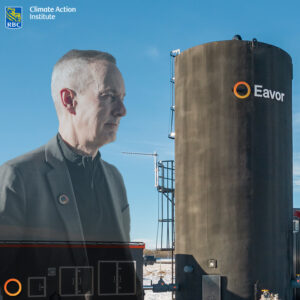RBC Climate Action Institute has introduced Eavor as a case study for how to tackle challenges Canada faces in transitioning away from fossil fuels.
Eavor’s technology, as explained by Redfern, taps into the immense potential of geothermal energy by harnessing the heat from hot subsurface rock, a resource readily available across the globe. This innovative approach not only yields zero greenhouse gas emissions and mitigates air pollution but it also minimizes water usage and has a small surface footprint.
Redfern explains optimism that there is a promising future for geothermal technology, anticipating a decrease in costs due to a technological learning curve. Geothermal energy is already proving economically competitive with natural gas for heating purposes, particularly in regions like Europe. Moreover, the technology holds great potential for enhancing energy security for national grids, a particularly pertinent concern following current events of geopolitical tensions.
Redfern highlighted how crucial it is that Eavor maintains full control over its intellectual property in order to continue cultivating homegrown technological expertise. This will assist in giving greater security to Canada’s talent pool, and allow the country to serve as a hub for innovation in achieving net-zero targets.
However, Canada currently faces significant challenges in achieving these targets, as highlighted by the report, and still needs to give significant efforts to lower emissions. Canada currently ranks the highest among major producers, emitting 683.3 kg of CO2e/bbl, which is above both Iraq’s 547.5 kgCO2e/bbl and the United States’ 539.8 kgCO2e/bbl. 84Mt of emissions need to be cut by 2030 in order for Canada to reach net-zero, which is estimated to cost approximately $50 billion.
This data underscores the urgency for action, especially in light of Canada’s commitment announced at the COP28 Summit to cap oil and gas emissions. If a policy to achieve this is approved, Canada would stand as the sole major oil exporter to impose a limit on hydrocarbon emissions.
Despite these challenges, there is optimism that Canada can lead the charge towards a cleaner energy future. With concerted efforts across government, businesses, and academia, Canada can leverage its resources and expertise to accelerate the transition away from fossil fuels and become a global role model in establishing a cleaner energy grid.



















